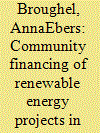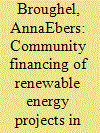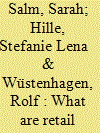|
|
|
Sort Order |
|
|
|
Items / Page
|
|
|
|
|
|
|
| Srl | Item |
| 1 |
ID:
166503


|
|
|
|
|
| Summary/Abstract |
Community renewable energy initiatives are increasingly recognized as important actors to trigger citizen investments in renewable energy facilities. Little is known, however, about the factors that determine the size of financial investments made by community renewable energy members. To address this gap, this paper presents a multivariate econometric analysis of the economic, social, environmental and institutional determinants of the size of investments in community renewable energy. It relies on a large-scale survey of 4061 members of two renewable energy cooperatives located in Flanders, in the northern part of Belgium. Results show that the return on investment is the most important determinant for members of large communities of interest, while environmental, social and other non-economic drivers tend to dominate financial motives for members of smaller communities of place. The presence of other cooperative members in close social networks plays a particularly important role in the latter kind of communities, highlighting the strength of social interactions as a driver for investments. These results can help policy-makers to design more adapted policy measures for fostering financial investments at the community level, and project developers to tailor segmented communication strategies about the goals and benefits of projects.
|
|
|
|
|
|
|
|
|
|
|
|
|
|
|
|
| 2 |
ID:
162337


|
|
|
|
|
| Summary/Abstract |
Small-scale investors are gaining recognition as a valuable source of private funding necessary for a successful energy transition. Still, there is limited knowledge about the characteristics of potential investors, especially in community renewable energy projects. This study intends to address this gap and investigates the impact of socio-demographic and socio-psychological characteristics on individuals’ willingness to invest in community renewable energy projects. Our investigation is based on two large-scale representative surveys of 2260 respondents in Austria and Switzerland. The majority of respondents would be willing to invest 1000 to 10,000 CHF/EUR in such a project, with higher amounts in the Swiss sample. Potential investors in Austria tend to be male homeowners with higher incomes, while Swiss investors are more educated. Generally, positive attitudes and beliefs related to renewable energy have a significant impact on investment intention. The largest group of potential investors in both countries can be described as ‘urban wind energy enthusiasts’, who show high acceptance of wind energy installations near their communities. Surprisingly, a significant segment of potential investors is skeptical of a nearby wind installation. Study results can be used by decision-makers to tailor appropriate policy measures and by project developers for communication of the project aims and benefits.
|
|
|
|
|
|
|
|
|
|
|
|
|
|
|
|
| 3 |
ID:
162342


|
|
|
|
|
| Summary/Abstract |
Small-scale investors are gaining recognition as a valuable source of private funding necessary for a successful energy transition. Still, there is limited knowledge about the characteristics of potential investors, especially in community renewable energy projects. This study intends to address this gap and investigates the impact of socio-demographic and socio-psychological characteristics on individuals’ willingness to invest in community renewable energy projects. Our investigation is based on two large-scale representative surveys of 2260 respondents in Austria and Switzerland. The majority of respondents would be willing to invest 1000 to 10,000 CHF/EUR in such a project, with higher amounts in the Swiss sample. Potential investors in Austria tend to be male homeowners with higher incomes, while Swiss investors are more educated. Generally, positive attitudes and beliefs related to renewable energy have a significant impact on investment intention. The largest group of potential investors in both countries can be described as ‘urban wind energy enthusiasts’, who show high acceptance of wind energy installations near their communities. Surprisingly, a significant segment of potential investors is skeptical of a nearby wind installation. Study results can be used by decision-makers to tailor appropriate policy measures and by project developers for communication of the project aims and benefits.
|
|
|
|
|
|
|
|
|
|
|
|
|
|
|
|
| 4 |
ID:
150061


|
|
|
|
|
| Summary/Abstract |
Citizens own nearly half the renewable energy generation capacity in Germany and have been important drivers of the country's energy transition. In contrast to citizens' important role in financing renewable energies, the energy policy and economics literature has traditionally focused on other investors, such as incumbent energy firms. To close this gap, this paper reports on a large-scale survey of 1,990 German retail investors. Conducting a choice experiment with the subset of 1,041 respondents who expressed an interest in investing in community renewable energy projects, we present a unique dataset allowing for new insights in risk-return expectations of retail investors. We find that apart from return on investment, respondents are particularly sensitive to the minimum holding period and the issuer of community renewable energy investment offerings. A minimum holding period of 10 years implies a risk premium of 2.76% points. A subsequent segmentation analysis shows that two groups of potential community renewable energy investors with different risk-return expectations can be identified: “local patriots” and “yield investors”. In contrast to professional investors, a majority of retail investors use simple decision rules such as calculating payback time or relying on their gut feeling when making investments.
|
|
|
|
|
|
|
|
|
|
|
|
|
|
|
|
|
|
|
|
|